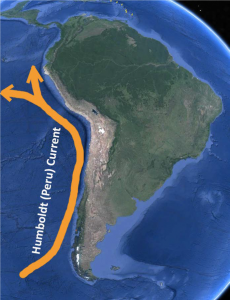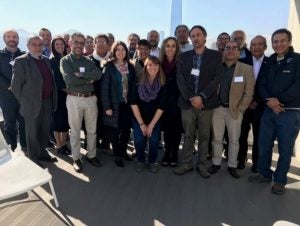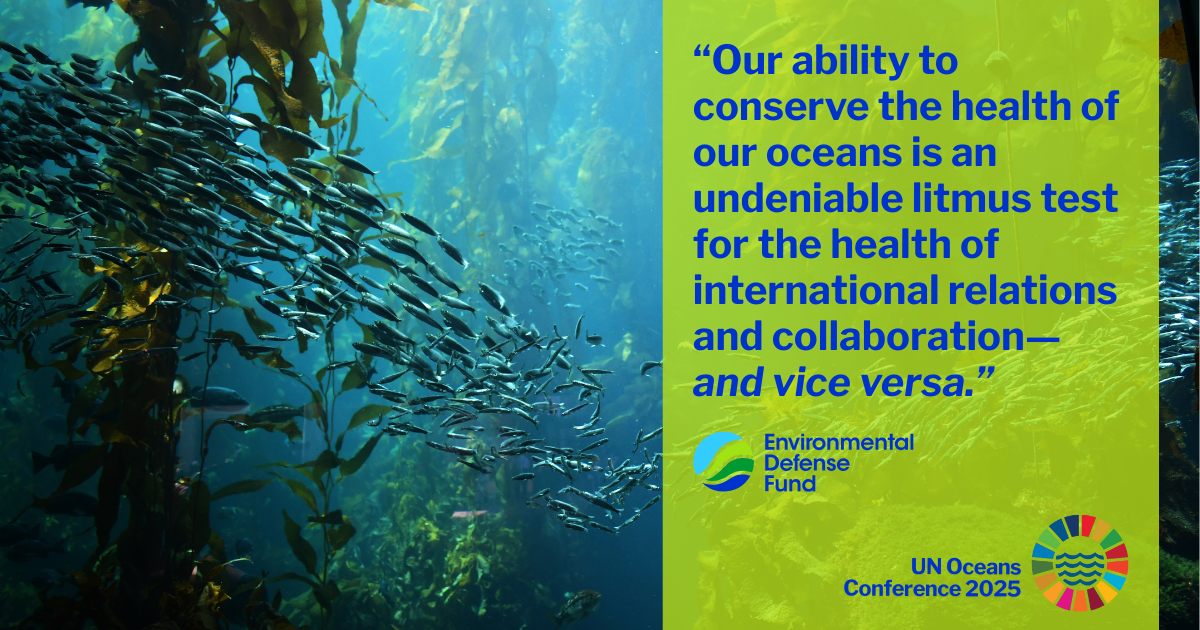A multinational plan for climate resilient fisheries in the Humboldt Current
 By Erica Cunningham and Merrick Burden
By Erica Cunningham and Merrick Burden
Climate impacts will be acutely felt by the millions of people living in fishing communities around the globe, and those in the Humboldt Current region of South America face immediate and difficult challenges. The Humboldt Current is one of the world’s largest and most productive marine ecosystems and spans most of the Pacific coast of South America, from Ecuador all the way to the tip of Chile. It also accounts for between 6% and 20% of the world’s total marine fish catch, depending on the year. Fish products from the Humboldt Current enter global supply chains and help to feed humans and animals as well as contribute to pharmaceutical products. Given the huge impact Humboldt Current fisheries have on the region and the world, it is a priority to ensure they become resilient to the effects of climate change. That’s why Environmental Defense Fund is working with national science and management agencies in the region on a multinational plan to help ensure a brighter future.
Research indicates that if we take constructive action to improve fisheries management in ways that address and plan for climate change, the future will be far better than if we do nothing. One of the most important factors that will affect the future of fisheries is the degree to which international cooperation occurs as fish stocks move across political boundaries chasing cooler water temperatures. Another important factor is the ability to ensure that fishing rates change in response to changes in the abundance and productivity of fish stocks as climate change occurs. Armed with a foundation of collaborative and innovative science, EDF is on a path to improve fisheries management in the Humboldt Current to ensure the region has the tools and solutions to build resilience and to adapt in the face of climate change. Our goal is to help ensure the future will not be one of conflict and scarcity, but one of cooperation and continued abundance.
Convening stakeholders of Humboldt countries
EDF recently convened fisheries science and management agencies from the three countries in the Humboldt Current (Chile, Peru and Ecuador), along with key academics and multilaterals (Food and Agriculture Organization and United Nations Development Programme), to discuss advances in climate and fishery science and create a roadmap for improved fisheries resilience and adaptation in the face of climate change. This workshop built on collaborative agreements between EDF, Peru’s Institute of the Sea (IMARPE) and Chile’s Fisheries Development Institute (IFOP), as well as collaborative agreements between IMARPE and IFOP and IMARPE and Ecuador’s National Fisheries Institute (INP).
 EDF facilitated this workshop to focus on four impacts of climate change on fisheries in the Humboldt Current, including:
EDF facilitated this workshop to focus on four impacts of climate change on fisheries in the Humboldt Current, including:
(1) Biophysical changes in the ocean environment
(2) Increased environmental variability (3) Changes in fisheries productivity
(4) Changes in species movement and distribution patterns
In addition, given the large level of uncertainty these impacts will cause for fishery managers, the group discussed how fisheries management in each country and as a region could be best prepared for these uncertainties — especially for critical transboundary zones such as the borders between Chile and Peru and between Peru and Ecuador. In addition to working toward management solutions, we advanced a common understanding of the fisheries management tools and innovations needed to create more climate resilient fisheries.
A tri-national vision for collaboration
As a result of this workshop and previous collaborations, the group agreed upon a tri-national scientific vision to create the following products between the three countries’ scientific institutes. Expert facilitation and assistance by EDF and input from management agencies and academia will support this collaboration.
- A baseline compendium of fisheries data and analysis for the areas of the Humboldt Current most in need of attention and most likely to be impacted by climate change.
- The creation of the SAP (Sistema de Alerta y Prediccion), the region’s first comprehensive system for shared observation, prediction and warning of climate impacts.
The innovative system created by all three countries will provide fishery managers with the information and tools they need to make better adaptive management decisions in both the short and long term. These decisions will depend on the impacts of climate change on fisheries’ productivity, abundance and movement patterns. In addition to the major outcomes listed above, by the end of this year, EDF will have completed a roadmap for how to achieve climate resilient fisheries in the Humboldt Current. We believe this roadmap, along with commitments made by stakeholders in all three countries, will position EDF to continue to foster and facilitate a science-driven process of fisheries management. By incorporating ecosystem considerations and creating innovative tools such as SAP, we will help to increase the speed and precision of management decisions — providing fishery managers, industry and fishing associations with the information they need to make the best decisions in the face of climate change.












